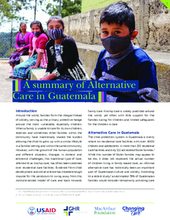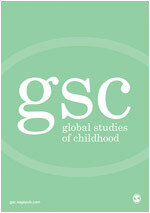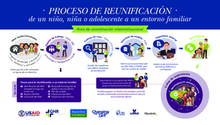This country page features an interactive, icon-based data dashboard providing a national-level overview of the status of children’s care and care reform efforts (a “Country Care Snapshot”), along with a list of resources and organizations in the country.
demographic_data
childrens_living_arrangement
children_living_without_bio
adoption
key_stakeholders
Key Stakeholders
Add New DataOther Relevant Reforms
Add New Datadrivers_of_institutionalisation
Drivers of Institutionaliziation
Add New Datakey_research_and_information
Key Data Sources
Add New DataPrevalence and number of children living in institutional care: global, regional, and country estimates
Reglamento de la Procuraduría de la Niñez y la Adolescencia de la Procuraduría General de la Nación
Revisión del gasto público asociado al cuidado de la niñez y adolescencia en Guatemala (2015 - 2019)
Acknowledgements
Data for this country care snapshot was contributed by a consultant with Maestral International and partners at Changing the Way We Care.
Displaying 21 - 30 of 141
These two case studies focus on kinship care: one describes kinship care in the Kenya context and the other describes family-based alternative care in Guatemala, including kinship care. They are meant to help practitioners better understand the practical implications of kinship and other forms of family-based alternative care and inform similar work in other contexts. These case studies have been produced by Changing the Way We CareSM, a global initiative implemented by Catholic Relief Services and Maestral International, and other global, national and local partners working together to change the way we care for children around the world.
Informed by a case review of 36 Guatemalan children supported to reintegrate into families, and interviews with social workers and psychologists engaged in the process, this article explores the role of the “community connectedness” wellbeing domain. The authors explore how community connectedness or lack thereof, can contribute to child and parent/caregiver wellbeing and successful reintegration—the different types of community connectedness and who/what was involved in establishing and fostering these connections.
In 2021 Changing the Way We Care (CTWWC) completed a household survey of children and caregivers, in demonstration countries Kenya and Guatemala, to understand their experience of CTWWC services, the protective factors in their families, and the status of child well-being. Part of CTWWC’s year-three evaluation, these resulting four reports are meant to help CTWWC partners, and other care reform actors within Guatemala and Kenya, better understand CTWWC’s impact through the end of the initiative’s third year.
This report contains the complete Kenya and Guatemala Household Survey results.
Este gráfico está destinado a los profesionales que trabajan en los organismos gubernamentales y las organizaciones no gubernamentales que participan en diferentes aspectos del sistema de protección y atención, pero específicamente en el apoyo a la reunificación, y detalla las funciones y responsabilidades específicas de quienes participan en este proceso en Guatemala y cómo deben coordinarse.
This graphic is intended for use by professionals working within government agencies and non-governmental organizations in Guatemala engaged in different aspects of the protection and care system but specifically in support of reunification. It details specific roles and responsibilities of those engaged in this process in Guatemala and how they should coordinate.
This two-pager highlights 2018-2020 results of the The Changing the Way We Care℠ (CTWWC) initiative for decision makers, government officials, media, other institutions or organizations working with children and adolescents, and private and public counterparts. CTWWC was formed in 2018 to transform care systems and demonstrate sustainable change at scale in 5 to 7 countries, including Guatemala, Kenya, Moldova, India, and Haiti. In Guatemala and around the world, more than 80-90% of children and adolescents living in orphanages (referred to as “protection homes” in Guatemala) have at least one living parent.
Esta ruta fue aprobada por la Secretaría de Bienestar Social para ser utilizada en Zacapa por los trabajadores sociales y psicólogas que están involucrados en el proceso de manejo de caso para la reintegración de los niños y niñas del cuidado residencial hacia el cuidado familiar. Esta diseñada para apoyar la celeridad de los procesos y atención a casos.
Case Management Procedures for Reunification and Reintegration of Children and Adolescents into Family and Community-based Care was developed together with Secretary of Social Welfare (SBS), the Office of the Child and Youth Advocate (PNA), Guatemala’s Attorney General (PGN), the Judicial Branch (OJ), the National Council of Adoptions (CNA), ASOCRIGUA and Hogar Aldeas de Esperanza. It was informed by Changing the Way We Care’s work in Kenya on the Caseworker’s Guidebook: Case Management for Reintegration of Children into Family or Community-Based Care, adapted to the Guatemalan context.
This report describes the process used for designing and facilitating focus group discussions with children and young adults, that informed the household survey design.









